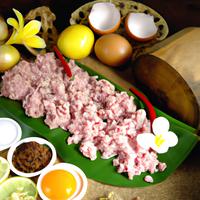
1 serving (100 grams) contains 143 calories, 19.2 grams of protein, 7.7 grams of fat, and 0.0 grams of carbohydrates.

Log this food in SnapCalorie

Nutrition Information
Calories |
340.5 | ||
|---|---|---|---|
% Daily Value* |
|||
| Total Fat | 18.3 g | 23% | |
| Saturated Fat | 6.4 g | 32% | |
| Polyunsaturated Fat | 0 g | ||
| Cholesterol | 131.0 mg | 43% | |
| Sodium | 131.0 mg | 5% | |
| Total Carbohydrates | 0 g | 0% | |
| Dietary Fiber | 0 g | 0% | |
| Sugars | 0 g | ||
| protein | 45.7 g | 91% | |
| Vitamin D | 16.7 mcg | 83% | |
| Calcium | 26.2 mg | 2% | |
| Iron | 2.1 mg | 11% | |
| Potassium | 683.3 mg | 14% | |
* Percent Daily Values are based on a 2,000 calorie diet. Your daily values may be higher or lower depending on your calorie needs.
Food Attributes
Source of Calories
About Lean minced pork
Lean minced pork is a versatile ingredient derived from finely ground pork, with a reduced fat content compared to regular minced pork. Commonly featured in cuisines worldwide, it plays a central role in dishes like Asian dumplings, Mediterranean kofta, and American meatloaf. This protein-packed option is rich in essential nutrients, including vitamin B12, zinc, and iron, which contribute to energy production and immune health. Its lower fat level makes it a healthier choice for managing calorie intake while preserving flavor. However, like other meats, lean minced pork should be consumed in moderation, particularly if paired with salty or processed ingredients. Opting for it in balanced recipes with fresh vegetables and whole grains can maximize its nutritional benefits.



